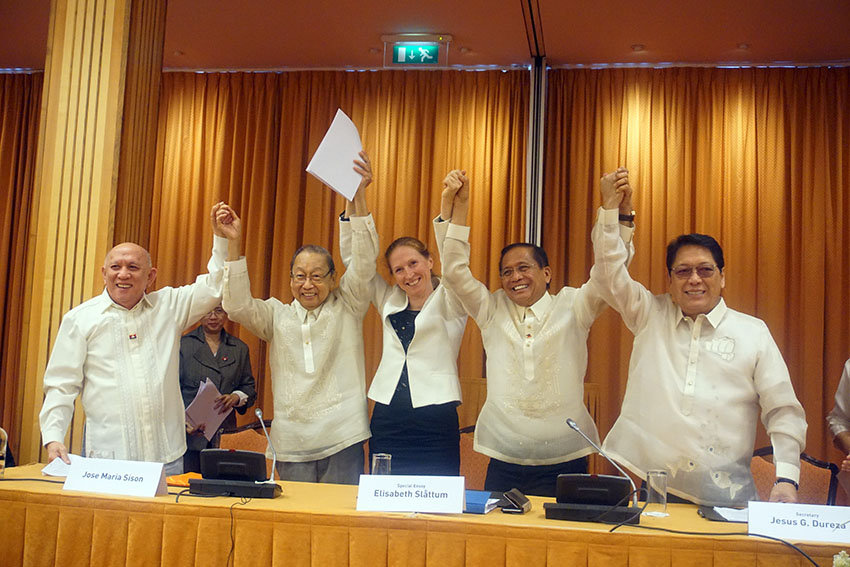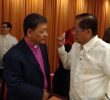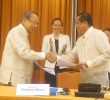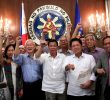
SUCCESSFUL ROUND. The Philippine government and the National Democratic Front of the Philippines conclude the fourth round of talks on Thursday, April 6, 2017 at the Radisson Blu Palace Hotel in Noordwijk Aan Zee in the Netherlands. Negotiators of the government and the NDFP raises their arms with the third party facilitator from the Royal Norwegian Government. L-R: NDFP peace panel Chairperson Fidel Agcaoili, NDFP Chief Political Consultant Jose Maria Sison, Norwegian Special Envoy to the Philippine Peace Process Elisabeth Slattum, Presidential Peace Adviser Jesus Dureza and GRP Chief Negotiator Silvestre Bello III. (Zea Io Ming C. Capistrano/davaotoday.com)
DAVAO CITY, Philippines — The Filipino farmers may be one step nearer to reaching their dream of having their own lands once an agreement on social and economic reforms is signed within this year between the government and the National Democratic Front of the Philippines.
Upon the conclusion of the fourth round of the peace talks between the government and the NDFP on April 6 in The Netherlands, both parties have “firmed up” their agreement on free land distribution to farmers under the Comprehensive Agreement on Social and Economic Reforms (CASER).
Up at stake is approximately 1 million hectares of land with the government eyeing to allocate P200 billion as budget.
“It’s the ballpark figure,” says a government source, adding that the government will allocate P200,000 per hectare for the land which includes haciendas, plantations and small private lands across the country.
The source, who requested anonymity, also told reporters during an interview at the Radisson Blu Palace Hotel in Noordwijk Aan Zee, The Netherlands that owners of some 650,000 hectares of land were already given notice of coverage under the existing Comprehensive Agrarian Reform Program (CARP)
But the 1 million hectares could be more, depending on the negotiations with the NDFP.
“It could be more, but possibly not less,” the same source who is privy on the negotiations of CASER told Davao Today in a telephone interview.
In an exclusive interview with Davao Today, Randall Echanis, NDFP Rciprcocal Working Committee on Social and Economic Reforms (RWC-SER) spokesperson said they believe that the coverage of agrarian reform could exceed 1 million hectares.
“Kasi talagang kung sa draft ng NDFP sa CASER, lahat nglands na suitable sa agriculture eh dapat, o lahat ng lands, either private o public lands basta pwede sa agriculture ay ipamahagi(Under the CASER draft of the NDFP, all lands, either private or public, that is suitable for agriculture should be covered and distributed),” he said.
Echanis said they will be giving the GRP a list of priority haciendas to be covered by free land distribution naming Hacienda Dolores in Pampanga, Hacienda Looc in Batangas, and Hacienda Luisita in Tarlac, among the priority areas.
“All those big haciendas that are currently under control of the big landlords such as the Cojuangcos are not yet distributed to farmers, even if it is under the Comprehensive Agrarian Reform Program, it cannot be distributed because the landlords are opposing it. Those lands should be given back to the farmers,” he said.
New law
The government source also said that a new law is necessary to allot the funding for the lands that will be covered by the land distribution.
“Dapat may bagong batas na magcover niyan, under CARL (Comprehensive Agrarian Reform Law) yan eh, panahon ni(President Corazon Aquino) ito yung mga tira-tira. For it to be funded kelangan may bagong batas,” the source said.
During his closing speech at the fourth round of talks, NDFP Chief Political Consultant Jose Maria Sison said the Genuine Agrarian Reform Bill “should be taken into account in making a new land reform law.”
The GARB or House Bill 555 was introduced by the lawmakers under the Makabayan bloc. It was first filed in the 14th Congress by then Anakpawis Partylist Rep. Rafael Mariano, who now serves as the Agrarian Reform Secretary.
The proponents of GARB stressed that previous agrarian reform laws failed to address the landlessness of the farmers.
“(The Comprehensive Agrarian Reform Program) provided non-land transfer schemes, like the Stock Distribution Option (SDO) scheme in Hacienda Luisita, Tarlac, corporative scheme in Negros Occidental, leasehold operations, and leaseback arrangements, and other schemes of corporate venture arrangements, which exempted vast tracts of landholdings of big landlords and agro-corporations from actual and physical distribution to farmer-beneficiaries. In addition, the establishment of Agrarian Reform Communities (ARCs) laid the ground for corporate intervention and control of agribusinesses over vast tracts of lands,” the Explanatory Note of the new GARB reads.
It added that CARP “automatically exempted from distribution agricultural lands of educational institutions and military reservations like the 3,800-hectare Central Mindanao University (CMU) and the more than 70,000-hectare Fort Magsaysay Military Reservation in Nueva Ecija province in Central Luzon and the 33,000-hectare Tumanduk Military Reservation in Panay.”
CARP was enacted under former President Corazon Aquino from 1988 to 1998. It was extended through Republic Act No. 8532 for another 10 years under former President Fidel Ramos.
Upon expiration on June 10, 2008, it was extended yet again by Joint Resolution No. 21 until December 31, 2008. Before 2008 ended, the law was resuscitated one more time to take effect until June 2009 by way of Senate Resolution No. 19 which stripped off the compulsory acquisition (CA) provision from its Land Acquisition and Distribution (LAD) component.
On August 7, 2009, Republic Act No. 9700 or the CARP Extension with “Reforms” (CARPER) was enacted which set another expiration date, June 30, 2014.
GARB aims to “break up land monopoly and implement free, fair, just and equitable distribution of the lands” within a five-year period. It also aims to transform farmer-beneficiaries into efficient producers by providing support services.
Bilateral teams
The issue on the “coverage” of the Agrarian Reform and Rural Development is among the nine major topics under the contentious provisions of the NDFP and the GRP’s drafts of the CASER.
To accelerate the negotiations on CASER, the parties agreed to convene Bilateral Teams, which are composed of three members from each party and supervised by a member from each RWC on SER and an indefinite number of experts from both sides.
The bilateral teams have set seven meetings before the fifth round of talks on May 26 to June 2.
In the fifth round of talks, the RWCs SER will continue its discussion on the remaining items under the Agrarian Reform and Rural Development (Part IV), National Industrialization and Economic Development (Part V), Environmental Protection, Rehabilitation and Compensation (Part VI) and the outputs of the bilateral teams. (davaotoday.com)









